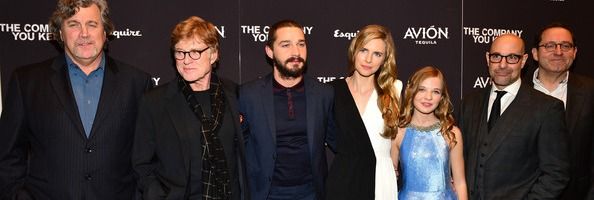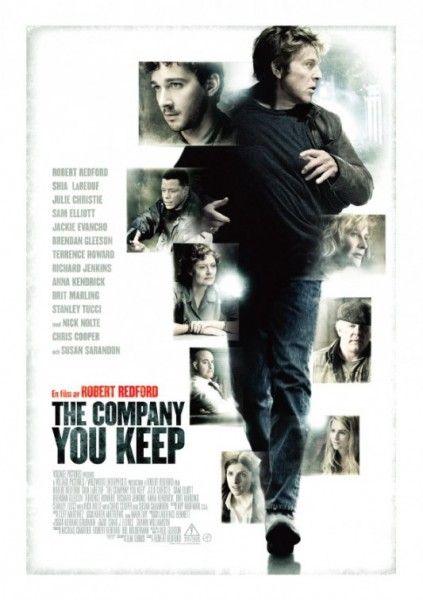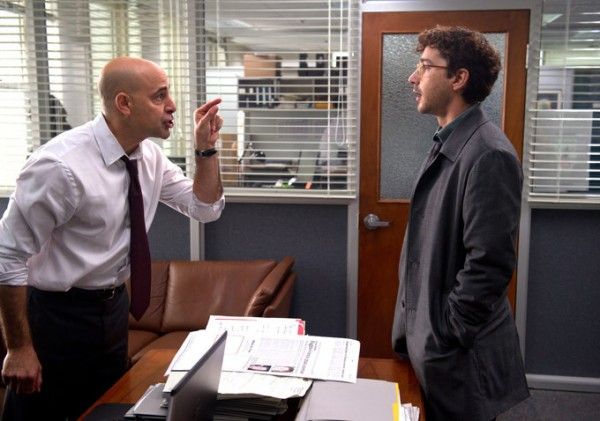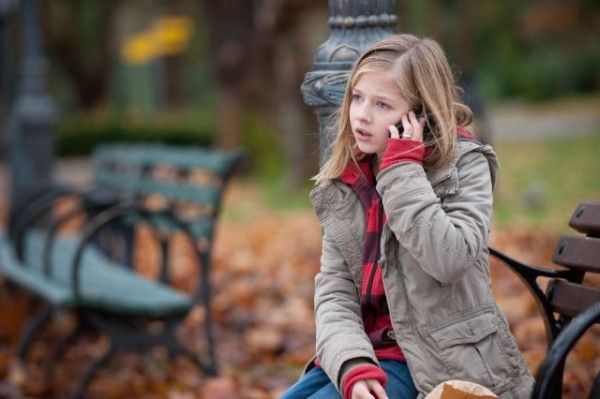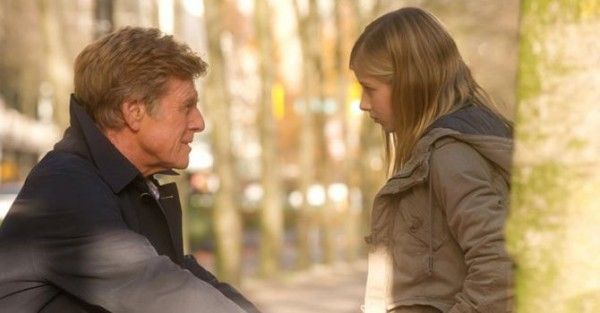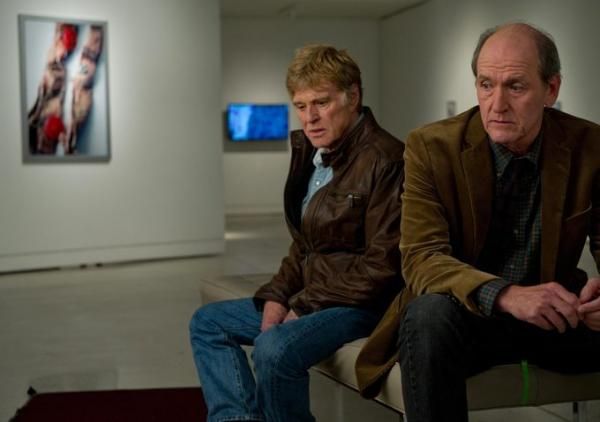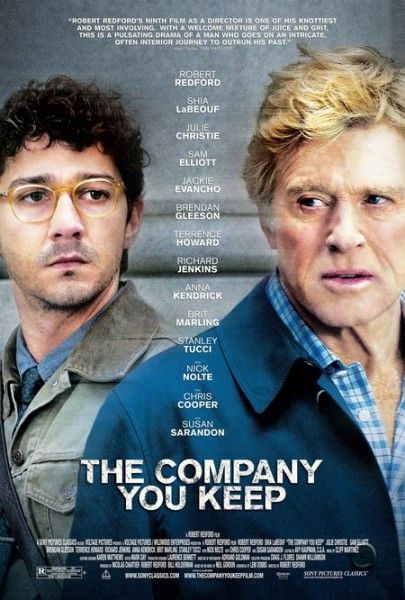In the new film directed by and starring Robert Redford, The Company You Keep, lawyer and single father Jim Grant (Redford) is living a quiet life in the suburbs when a housewife (Susan Sarandon) is arrested and revealed as part of a 1970’s radical gang, known as the Weather Underground. Young and thirsty reporter Ben Shepard (Shia LaBeouf) digs into her history and uncovers Grant’s secret- that he is in fact another member of the gang in hiding. Grant goes on the run across the country- closely followed by the FBI and a truth-hungry Shepard- to try and clear his name and win back his daughter. Along the way, both men discover things they can’t outrun about the past and about themselves. The film also stars Julie Christie, Nick Nolte, Chris Cooper, Terrence Howard, Stanley Tucci, Richard Jenkins, Anna Kendrick, Brit Marling, Sam Elliot, Brendan Gleeson, Stephen Root and Jacqueline Evancho.
Collider was on hand at a press conference given by Redford, and co-stars Tucci, Marling and Evancho. Redford had a lot to say about his costars (upon all of whom he lavished extreme praise), the material upon which the screenplay is based and drawing from the story of Les Miserables when creating his character. Redford was not shy to open up about his political beliefs regarding the radical movement, nor to buck talk of Academy Awards, claiming he is “not in that business,” but he did speak about his Sundance Institute, which is actually where he met Marling as she got her start in the industry. The other actors also had nothing but admiration and praise for their leader and the rest of the all-star cast. Click here to read more.
When asked what drew him to the material, Redford explained:
ROBERT REDFORD: It was the book that I read 5 or 6 years ago that was the very…I was drawn to the book it's a wide ranging book it and a lot of plot lines it had a lot of email stuff going on, many, many characters. There was something at the core that captured my attention, and so the next 4 to 5 years we spent shaping that material into what could be a film. So yeah, I was drawn to the material…that's how it started…and then Lem Dobbs came as a result of hiring him to write the screenplay...It was reshaped and reshaped and reshaped, kind of sculpted.
When asked about the differences between indie filmmaking and bigger budget, star powered films, Marling replied:
BRIT MARLING: I guess in some respects there are differences. The craft service table is a diff craft service table. Honestly, for me it always comes back to the story and how attracted you are to the story and how compelled you are to be a part of telling it… It's not set back then it's set in present day as this group has come into age and wisdom and experience and are looking back and are wondering about the radicalism of their youth and wondering if they made the right choices and would they do it differently now. My generation is grappling with a lot of the same ideas so I was very attracted to that part of the story.
Redford was keen to express his enthusiasm for Marling and her career:
REDFORD: We were overjoyed to launch her first film and her second one Another Earth and Sound of My Voice at the Sundance festival. That's how I came to know Brit and the whole idea was, her work was really, really special and I thought well some way, somehow, some time I'm gonna find a way to work with her so I was very motivated by what I had already seen so it was a particular joy for me to be able to invite her into this film.
The admiration was not one-sided, as Marling added:
MARLING: The fact that I may be able to make a living as an actress and writer I owe entirely to this man and to the institution he created as a safe haven for artists and filmmakers...without that I don't know, I might be investment banking, who knows what I might be doing.
The actors were asked about approaching their characters and their preparation for the film:
STANLEY TUCCI: I have to say it was all there on the page, it was very well written, very well realized. I don't know that I had to do that much, and I had Shia and that energy to work off of and Bob's very clear and succinct direction. So our rehearsal was minimal for the most part. Shia and I worked one day and then we went in and did it. The scenes are very straightforward. You know, he is the classic, curmudgeon, exhausted editor. I think particularly in this day and age he's an interesting character, he's the last of a dying breed.
REDFORD: I wanted to add a few words about um...Stanley. My dear friend what’s-his-name. Stanley and I have some history together we go a ways back and like Brit, obviously I'm very indebted to people who come in for no money at all, who come in and help me with the Sundance Institute. Stanley was one of the first advisors we ever had, he gave his time in a crucial point in our development. We got to know each other, then his first film he directed...one of the great honors that I'm able to share with you all is that this is a wonderful cast and I'm blessed with my colleagues coming onboard. Cause listen, there’s no money in film these days. It’s shrunk down to a nub. And you have to depend on the kindness of not strangers but of colleagues to come in and help you and I was blessed by having a wonderful cast.... Stanley coming in, he didn't have to, there was nothing in it for him. Except the joy of working with me. (Laughs)... He talks about the energy, Shia’s energy which is extreme. Shia has a fast mind and a fast tongue and for Stanley to work with that and still be the character that he had to play, he had to be a man in control within an industry that was going out of control...the fact that he could manage the energy by creating a counter energy as Shia got more crazed, Stanley went the other way so it creates a dynamic. When Shia slows down Stanley goes for his throat I didn't have anything to do with it.
TUCCI: But that’s the thing, Bob really is an inspiration in that regard for me. Of course as an actor but as an actor/director and I figured if he could do it anybody could do it. (Laughs). But to watch him as an actor is always a joy but to see the way he directs…the way he goes so effortlessly back and forth from one side of the camera to the other is an inspiration, and the creation of Sundance he gave us all a huge, huge opportunity and continues to give us an opportunity. So for that reason alone, just to be in the movie was an honor, you want to give back in whatever way you can. If it’s just by ‘ok, I’ll be in your movie if that makes you happy.’ Why that would make you happy I don’t know.
Redford also discussed the addition of 11-year-old Jaqueline Evancho to the cast. Jacqueline (referred to by her castmates as Jackie), is best known as a singer since 2009 (she’s had 5 albums, one platinum 1 gold) and in 2010 she won 2nd place on America’s Got Talent.
REDFORD: It's a wonderful story, it’s a story where you take a risk and it pays off… I was in Vancouver getting ready to film and I couldn't find the young actress, the 11 year old to play my new daughter. And kids in films to me has always been a big deal because I’ve always wanted to see a child who can just be and not act and so I was frustrated in the interview process because I was interviewing girls who were lovely, fine but the mothers were dressed like they wanted a part in the movie… And then kids were busy acting, they're talented they're skilled but they're acting... We were going to start filming Thursday, it's Saturday night I’m sitting in the hotel room depressed, mindlessly surfing and suddenly BOOM. There’s this vision on the screen, this angelic creature that was 11 years old, and I said woah wait a minute what’s this.’ Because I don't watch much television. She's singing Puccini, I’m thinking, ‘wait a minute, how does that work?’
The camera pulls back and there’s a symphony hall and a huge orchestra and there’s this creature and right away something clicked into gear, because I was desperate, and I said somebody who has that composure who can do that in front of that kind of audience in that kind of register with that kind of conviction, maybe that could work. To make a long story short I contacted the casting person, ‘find out where she is.’ She was in Pittsburgh living a normal life… and they went out and taped her I don’t think they knew what was going on. They sent the tape back, it was clear she didn't know what was going on, I said ‘I don't care there’s something going on, I'm going to take this chance.’ She was hired on Tuesday, we filmed Wednesday, we filmed the first day I met her and I tell you I figured from that point on I figured I’m one lucky man because she turned out to be absolutely lovely. We just played together, we became people who could play and have fun and improvise together. So I ended up the beneficiary of a risk taking and Jackie was worth it.
JACKIE EVANCHO: To be honest I really don't know what to say. All I can say is that I was extremely honored to have a chance to actually act with you guys and I was really excited that I got the role and I just really had a lot of fun so thank you.
TUCCI: Were you nervous the first day?
EVANCHO: I was extremely nervous I didn’t know what to think.
REDFORD: But she was so busy having fun, it disguised her nervousness.
When asked if she had known the name Robert Redford, Jackie answered candidly:
EVANCHO: Well, um, my dad, he always talked about it with his brothers he’d just joke around and stuff so when I heard the name I wasn't very familiar with it…I shouldn't say it, it’s an amazing name I'm sorry. The only thing that I knew was that my dad, he’s like, ‘he played a cowboy’ but I thought it was an amazing honor so thank you, sorry.
When asked what Redford wants people in the 21st century to take from this movie about legacy of the Weather Underground, he replied:
REDFORD: There are probably a number of things I'd like to take away. To simplify it, some films are made not to necessarily think, but it’s like eating cotton candy you have a wonderful ride then its over and that’s all that you want… Some films are designed to make you think or at least ask a question afterwards...the second thing had to do with a criticism I have with my own country. I don't think we’re very good at looking at history and a lesson that we learned so that we don't repeat a negative experience. Looking back in time saying this ‘that happened what can we learn,’ we’re so busy doing doing doing, we don't look back and say ‘gee, what can we learn from mistakes we made before.’ So I guess the hope, that’s all it can be is a hope, is you look back at this moment in time which, by the way when this happened, I was of that age, I was with them in spirit but because I was starting a career in the New York theater, I was an actor, and I was also starting a family I was obligated to that task. So I wasn't a part of it but I was certainly empathetic to what they were doing because I also thought it was a wrong war, a war that was going to cost unnecessary lives. It was also a war designed by people who had never gone to war and it had a lot to do with a tragic history of the U.S. and mistakes that were made that we never pay attention to… I would hope that you look back and it’s not about what happened then it’s about 30 years later, there’s a wonderful poem by Yeats… there’s a line that says, because he was so sick of what was happening to Ireland, he could see that calm Ireland was about to be disrupted by Evangelism, by revolt, by revolution... So he was bemoaning that by taking a conservative stance…he says “the best do lack conviction, and the worst are full of passion and intensity.” And I thought that was a nice thing for me to play with, is people who were filled with that passion and intensity, grow older and look back. They are trapped by their past...but how long can you live without your true identity. That’s what interested me, to tell that story, not then but now.
Redford also had strong opinions about journalism and the media, which play a pivotal role in this film.
REDFORD: It’s tricky business when an artist starts to mess around with journalism. I’ve done that before. Basically, I was protected by a story that was written by somebody else and I was just documenting that. But it’s tricky because I don't know that the media are comfortable being criticized by people who are not in their own world, I don’t know I might be wrong, it’s just a hunch. In other words you have to be careful. On the other hand because I have such a keen interest in the media, I think it plays such an important role in our society, I'm very concerned if it’s ever threatened and if it is threatened I would like to know how and what and maybe that’s a story. The internet has so drastically altered the landscape of journalism because now you’ve got so much information, how do you find the truth?... You have the far right and far left hammering stuff...so the public maybe gets fed up and turns away and there’s real danger...I really saw the Shia character, I guess to me there’s a hint of a story that I've always loved. There were two stories that I always loved as a kid, Phantom of the Opera, I've always wanted to play that part and then Les Miserables, I just thought when I was a kid that was one of the great stories. Shia’s character is the Inspector Javert and I am the Jean Val Jean in a sense that I go to prison for something I’ve done that’s wrong, I take on a new identity to escape prison time. I have a daughter, the daughter means everything to me...so here it is and yet there’s someone on my tail who might expose me…that was the complexity that sparked me.
Redford explained why he felt it was unnecessary to meet any of the people who were a part of the real Weather Underground group.
REDFORD: I didn't feel I needed to because I saw a doc several years over that came to the festival called The Weather Underground and I felt that that doc. was very well made about the actual people. I didn't feel I needed to meet them. Also this was a piece of fiction that had to have a piece of truth to it but it was really about their lives later... But I did meet the son of Bernadine Dohrn and Bill Ayers who lives here in New York and Chicago, he's a teacher and that was it. I figured I didn't want to go to far into it because this is a piece of fiction, dramatic fiction and I want to be able to take it on but use as the basis of who these people really were. I think we’re all moving on we work we do something. If you stay with something too long it’s probably not a good thing. I'm happy to talk about this film because I'm proud of it. I’m proud of the actors who were in it. I was able to make the film I wanted the way I wanted to make it so I'm proud of that.
Redford also discussed finding old photos of himself to use as set decoration and as key props in the film:
REDFORD: It’s not terribly interesting I just had to go through archival stuff and find old photos of myself and be depressed. Some of the photos had to be, there was I know a photo from Jeremiah Johnson, I had to put outfit from the candidate on the face, that was kind of interesting. But it was just something that was right for the film to show time passes, people age.
When asked about if a mugshot photo was real and if he’d ever been to prison, Redford laughed and quipped:
REDFORD: No, fortunately not. There were times I could have but I didn’t.
A veteran of the Vietnam war in the crowd asked Redford and Tucci if they drew on experience from that time period when creating their characters:
REDFORD: I’ve already said enough, I’d love Stanley to take that one.
TUCCI: Well I was 4 years old but I know I look a lot older, thanks very much I think we’re done here (laughs). No I didn't have anything personal to draw on only having talked to people who were in the war. I had a cousin who fought in the war who was there for 2 terms and people I've met and things I've read. Also as I said before when you approach certain films if it’s there on the page, which it was here, sometimes that’s really all you need. I think after you've been doing it also for a long period of time, sometimes you do need a lot of preparation and research but for this role it was all really there.
A member of the press asked about the elements of previous films Redford has directed and appeared in that were combined in this film- namely the emphasis on family, as in Ordinary People, thriller aspects akin to Sydney Pollack films and newspaper drama as in All The President’s Men with Alan Pakula; and if these elements were helpful to Redford to draw on when making this film.
REDFORD: It helped in the sense that it enabled me to put them all together in one film. I made those films for specific reasons relating to those specific areas. To be able to see a chance to combine them all into one film and have the relationship with the reporter and Stanley’s character, the editor drive the story- because they are the driving force. ‘Get the story get the story don't make mistakes be cool be cool.’ That has it’s own energy and that’s a driving engine. Then you have the thriller part, the man on the run to save his life and his daughter and then you had the family, because that’s what it was about. It was about a man’s chance when he'd failed before to have a real life and family. It was a chance to put all three together in one.
When asked what the actors would ask Redford’s character, they all had different responses:
MARLING: That’s a really good question. Um I guess it would be interesting to know what someone would think about radicalism now. What was so exciting about Weather Underground was that these things weren’t necessarily happening to those kids, they were predominantly from affluent suburban families. Everyone knew someone who went but they felt a sense of radical accountability for what their country was doing and I wonder where that sense is in my generation. Why don't we feel the responsibility to be the voice of change, stand up for what we believe in? I don’t know what he would say about that.
REDFORD: I was thinking about that time 30 years ago and the commitment, because that was a young people’s movement. And I'm imagining you and I think I know you well enough to know you would have been somehow connected. But that generation came so close to accomplishing, so close to get to the final point of destination, and then collapsed before they got there. It’s a movement that kind of ate itself, you wish they had gone one step further, they were so close. Now it’s 30 years later, your generation is Occupy Wallstreet and other organizations. I’m curious what your personal views are about that movement, and the fact that it was similar, it came close.
MARLING: It didn't quite…it’s funny, Zal [Batmanglij, co-writer of film The East] and I were writing something at the time that was about the sort of Occupy movement before the movement happened. And we were about a week away from shooting this film when Occupy Wallstreet happened, and we were like, ‘oh, great. Someone has finally tapped into the collective unrest and given it a voice and is organizing.’ But I think what maybe happens is all these ideas come up, and then what’s the action? A lot of young people, I watched them leave their jobs and go knock on doors for Obama, so excited about change. But once he was elected, it’s not like they left their jobs and took to the streets… I don't know why the Occupy movement crested then didn't quite dig in but one gets the sense that so many people are so comfortable, that the impact isn't on them on a daily basis and so they’re unwilling to walk away from the coma of their daily lives to really stand behind change. But I still think it’s very possible, maybe my generation is sort of straddling one foot being an anarchist and one foot play by the rules, and trying to change the system from within. I don’t know what happens to progress, do you pick a side, do you fall in the chasm in the middle? I’m not sure, I wrestle with that everyday.
REDFORD: It’s interesting what you said, you said it’s a possibility. [Julie] Christie says...’it’s never over because as long as the cause is there the reason to revolt is there’...we were having that debate which think was structured in such a way that the audience would have that discussion. But for you, you wanted something to happen with the voice of your generation. One of the things that’s beautiful about Brit and one of the joys about working with her is whatever Brit does, whatever role she plays there’s always the truth. She's a person of supreme truth, whatever she’s doing, truth just comes through. That’s such a valuable asset. I felt that when we met, when we first talked, I felt that in her work we saw at the festival. To be able to let that happen in a film, to give it over to her, anything I did or said was just like... take it and go with it I know whatever you do the truth is going to come out and that’s going to be a powerful force against what Shia was playing with. So I would think that maybe Brit, I felt the same way when I was young, I was disappointed that something wasn’t reached, because it was my generation, my voice I wanted to succeed. We felt we were not being told the truth so we wanted to be the voice of truth.
Jackie had a much more simple answer to what she would have asked her father character.
EVANCHO: I probably would have asked where you were, and what you were doing, and why you left.
Redford was asked if he stumbled across any positive thoughts about journalism and the country.
REDFORD: Positive? I don't know about positive as much as valuable. Because I consider journalism so valuable I would almost take it personally if journalism failed itself because that’s the one avenue we have to the truth. So if I'm going to portray journalism in a film that’s a tricky business. You want to at least give it it’s due. And maybe describe the threats that are against it. The idea of Shia’s character was to me more interesting but it was complicated by the fact- is he going after the story for his own personal reasons or is he getting the story? What is unmistakable is what he learns about himself in the end, in his pursuit of finding himself, of finding somebody else that may change him. You have to be careful when doing journalism...about trying to be pedantic or academic touch certain things then back away and let audience do what they want.
When it came to a question about if Redford thinks he may have helped Julie Christie win an Oscar, he was not shy about expressing his opinion on the subject.
REDFORD: I would never try to get somebody an Oscar nomination. That’s not my business. Awards are not my business. Julie became my business. I saw her because I knew her when she was younger we were around the same age, both had film exposure around the same time I realized that she was radical then and I assumed she might stay that way but I had no idea. I saw a film she made, she disappeared from the face of the Earth then she showed up in a film about Alzheimer’s. I thought unless that was a real life thing for her maybe I should call her. It took a while to get her, she’s remote, she's in a remote area of Spain sometimes London. It took 2 months of conversations, first of all trying to find her, secondly listening to her telling me why she shouldn’t do it, didn’t think she could do it, and perseverance ruled the day she finally came and did it and well, I think the effort should speak for itself.
When questioned further about the comparison Redford had made between his character and Jean Val Jean of Les Miserables, he elaborated:
REDFORD: The price I pay is the idea that I’m going to have to give up the life I'm leading under my false name to have my real name, so my relationship with my daughter can be clean and pure. And what the cost is going to be, what is the cost to reveal that at that point in time. I’m not seen as innocent I'm seen as guilty but the only way I can clear my name is by getting to Christie. The run is almost impossible, the odds are against him, the reason he’s able to buck those odds is the love of his daughter... It’s all about redemption and sometimes facing a hard truth in order to do it. In order to be able to face his daughter and live a clean, honest life there was going to be some damage he'd have to repair but the damage was worth not having to lie.
Finally, Redford was asked if casting Terrence Howard as the lead FBI agent was progressive casting.
REDFORD: I think Terrence is a wonderful actor he was in a film at our festival called Hustle and Flow, that’s when I first met him, and I thought he was really good. I wanted him as an actor in that role and I'm glad he did it he did a good job.

